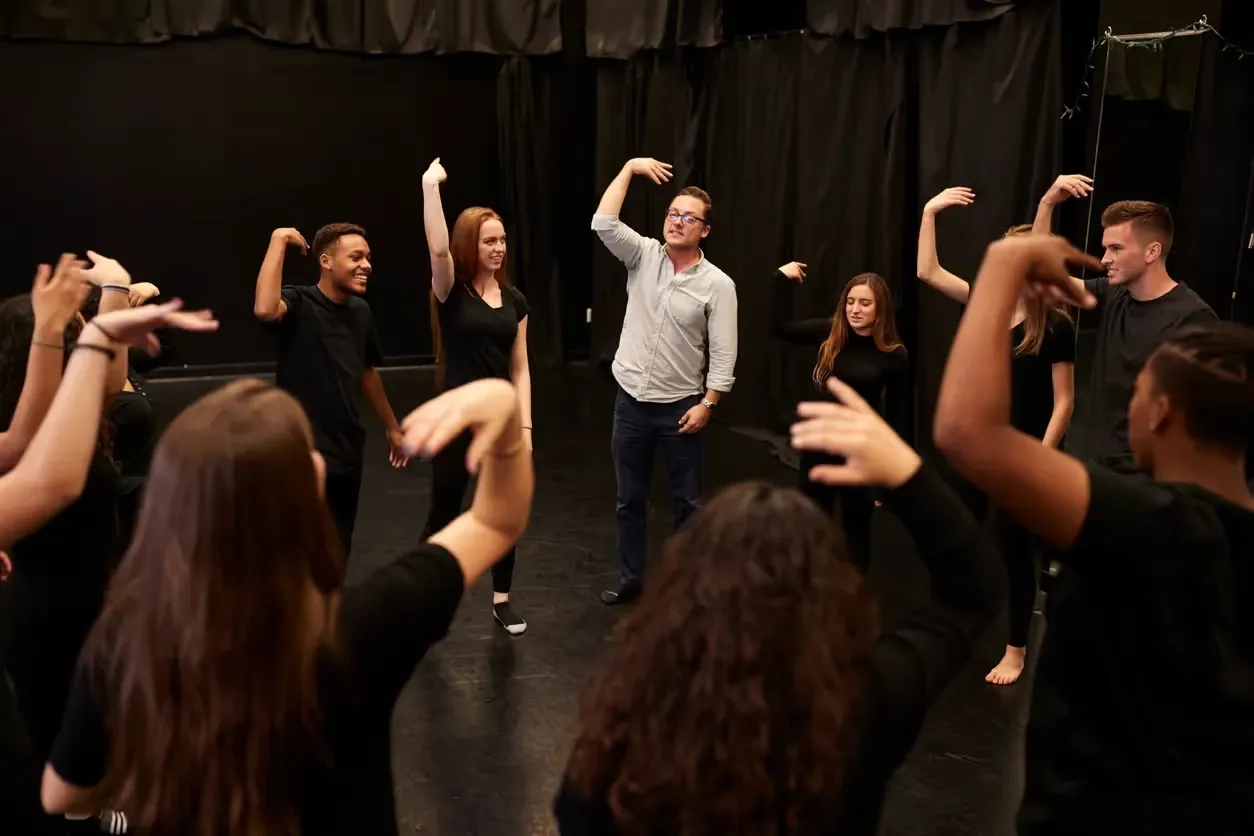Developing your skills as a lawyer goes beyond the training you receive in law school, especially if you own your immigration law firm or are a partner and responsible for finding new clients and managing team members. From marketing to branding, to building your professional network, immigration law is a multifaceted occupation that leans on both hard legal skills and soft skills.
One of the best, yet rarely explored ways, of learning these important soft skills is improvisational theater, often known as just “improv.” Indeed, improv is a fantastic way to engage a person’s creative side and work on important soft skills in a low-risk environment that’s also fun.
In this article we’re going to learn a bit more about what improv is and how it came about and how improv can help you as a legal professional work on a variety of important soft skills to make you a better lawyer, advocate and law firm owner.
What is improv theater?
Improvisation theater, or improv as it’s more commonly known, goes as far back as Ancient Rome and, at its core, involves performing without a script. Improv has traditionally been closely tied to comedic performance, but it has in fact transcended the theater and is part of other forms of performing arts as well such as music, specifically jazz, and television and film through shows like Whose Line Is It Anyway and Curb Your Enthusiasm.
Today, we find that improv has gone beyond the context of art and performance and is now a professional development tool, too. The Second City, arguably one of the most famous improv theaters in the United States and Canada with such recognizable alumni as Tina Fey, Catherine O’Hara, Mike Myers, and Steve Carell, has a corporate training division focused on “using humor and authenticity to connect with employees.”
Other instances outside of performing arts where we see people using improv to better their communications skills include business schools and legal continuing education programs, to name a few. Improv demands, and thus teaches, flexibility, collaboration, and creative problem solving, gets you to exercise these skills in a low-stakes environment, and above all, is fun.
So how does improv work? Generally improv is a “no rules” kind of activity but there are a few key tenets worth knowing.
Saying “Yes, and.” The cardinal principle of improv is “yes, and.” Meaning, accepting a situation or premise or set of facts that you’re given during an improv scene, saying “yes” to that information, and then adding to it, thereby moving the scene along.
Active listening and collaborating with others. In order to create a successful improv scene, you have to actively listen to your scene partner in order to “yes, and” what they are saying and come up with your own lines, on the spot, to progress the show. Both active listening and collaboration are also crucial skills as an immigration lawyer - these two characteristics can transform your relationship with clients and build stronger professional relationships within your lawyer network.
Showing your authentic self and getting comfortable with failure. The more comfortable you are in being yourself, the more authentic you will come across as to your current and prospective clients, partners, colleagues, etc. And when it comes to failure, the worst that can happen in an improv setting is that the audience doesn’t laugh at something you think might be funny. Exposing yourself to failure and uncomfortable situations can help you build resilience to face real life obstacles that come with immigration law practice.
Keeping these rules in mind, then, what are the benefits that improv can bring to immigration lawyers?
What are the benefits of improv for immigration lawyers?
Improv can benefit your professional practice - and even your personal life - as it helps you work on important life skills that incidentally make you a better immigration lawyer, too. Granted, improv is not the first thing that comes to mind when we think of professional development for attorneys, but if you do give it a try, here are some of the benefits you can expect to gain from improv that may be of value to you.
Improv builds your empathy
Empathy, or the ability to understand and share the feelings of another person, enables you as an immigration attorney to better understand and relate to your clients. The better you are at empathizing with your clients, the better you are as a provider. And when it comes to improv, it’s actually one of the best ways to build empathy. For example, the main tenet of “yes, and” requires you as an improv performer to listen intently, agree with your scene partner and validate what they’re saying by adding to it. Active listening, fundamental agreement and validation all help build empathy.
Improv helps you flex your creativity muscle
Whether you’re trying to market your law firm in a memorable way or you’re tackling a novel visa situation where there is little precedent or guidance from DHS, creativity is a major key to success. And because improv inherently requires participants to come up with ideas and dialogue on the spot, it requires participants to really flex and build their creativity muscle. How? Creativity requires taking risks with your ideas, and the only way to do that is to not have fear that your ideas will be judged. That’s where the “Yes, and” tenet of improv comes in - every idea is accepted and built upon, and that environment or support and collaboration fosters creativity. By practicing that on an improv stage, you build your creativity muscle and are then more easily able to bring that to your work as an immigration attorney.
Improv builds your communication skills
Improv relies on effective communication, both among those performing, and with the audience. Not only is it important for performers to be able to catch and interpret the audience’s cues, but those performing together need to fine tune their verbal and nonverbal communication skills to build upon each other’s ideas since improv performances are made up on the spot. Improv helps you build communication skills by teaching you to build rapport with others through purposeful, effective communication.
Improv is a fun way to build professional skills.
It's important to remember that work can have some elements of fun. Indeed, having at least some fun at work helps boost productivity and, in general, helps balance out other professional building activities you might already participate in, such as taking traditional CLEs, leadership courses and more. Simply put, adding improv into the mix of development workshops simply makes work more fun!
Docketwise streamlines your practice while you’re at improv class
In a world full of productivity hacks, tips, and tricks, leveraging improv as a tool can be just what you need to become more effective at work and to make work more fun at the same time. Well, at Docketwise, our entire workday revolves around creating the most complete and streamlined immigration case management system for immigration law firms of all sizes and across specialties.
From immigration forms, to electronic communication tools, payment features, and integrations with other useful tech platforms, Docketwise helps you stay up to date on all your immigration cases, communicate easily with your clients and team members, and otherwise build and manage your immigration law firm.
If you want to learn more about Docketwise, schedule a demo at the link below, or sign up for our Immigration Briefings newsletter for daily and weekly immigration updates!
Carve Your Niche in Immigration Law
Unlock the potential of your personal brand and set yourself apart in the world of immigration law. Harness the tools, strategies, and insights to become the go-to expert in the immigration law landscape.
Download Now
About the author

James PittmanAttorney & Co-FounderDocketwise
James Pittman is co-founder of Docketwise and was previously engaged in the private practice of US Immigration Law. He also regularly teaches Continuing Legal Education (CLE) classes on immigration law topics and legal ethics. He is admitted to practice in New York and New Jersey and is a graduate of Northeastern University School of Law.
